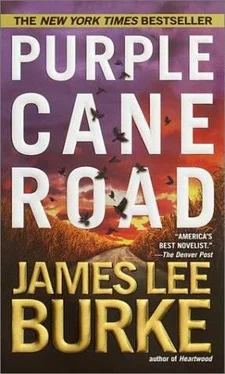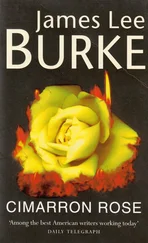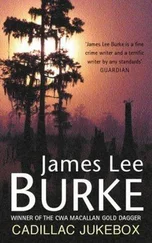"I always thought my mother betrayed me, Johnny. But I learned to forgive her. I did that so I don't have to be a drunk anymore."
"You saying something about my mother now?"
"You're smart. Read Chaucer's story about the three guys who set out to find Death and slay him once and for all. They found him, all right. But things didn't work out as they expected."
"Let me tell you what real revenge is. I'm gonna shake down the people who did your mother, then I'm gonna leave the country and have them killed by somebody else. But you'll never know for sure who they were."
"Pull on your own pud, Johnny. This stuff is a real drag," I said, and clicked off the phone. Then I walked through the house and pulled the phone connections from all the wall jacks.
The sheriff lived up Bayou Teche in a yellow and gray frame house with a wide gallery, set back under huge cedar and oak trees. When I drove out there Saturday afternoon, he was trimming back the climbing roses in his flower bed while his grandchildren played in the side yard. He wore a tattered straw hat to protect his head from the thorns, and his stomach hung heavily over his belt. In his home setting, cupping flowers and placing them gingerly in a bowl of water, his clothes stained with fungicide and house paint, the sheriff looked much older than he did at the department and nothing like a law officer.
I sat down on the front steps and picked up some pieces of bark from a bag of mulch and flicked them out into the grass.
"I made an ass out of myself when I attacked Jim Gable. I also brought shame on the department. I want to apologize," I said.
"You got to rein it in, Dave."
"I believe you."
"Five-day suspension without pay, effective last Monday. A letter of reprimand in your jacket. Is that fair?"
"There's something else I have to tell you," I said. "Passion Labiche told me she helped her sister kill Vachel Carmouche." I waited for him to speak but he didn't. "Number two, I had the chance to plant one in Johnny Remeta's cauliflower and didn't do it."
He paused in his work but his face showed no expression.
"You froze?" he asked.
"I had him set up. I was going to cut all his motors."
A mosquito buzzed at his face and he rubbed his cheek with the back of his wrist.
"I'm going to retire soon. I'm glad you told me what you did."
"Sir?"
"I'd like you to be my successor," he said.
"Come again?"
"What are you going to do with Passion's confession?" he asked, ignoring my incredulity.
"It'll be dismissed as an eleventh-hour attempt to stop Letty's execution," I said.
"Maybe that's just what it is. You think of that? Where's Remeta now?"
"He inasmuch told me my mother's killers are the same people who tried to have him killed on the Atchafalaya. He says he's going to extort them, then hire a button man to take them out."
"You actually had that guy locked down in your sights? Then didn't say anything about it till today?"
"That's it, more or less."
He locked the clasp on his clippers and dropped them in his pants pocket and looked at his grandchildren playing.
"Remeta is going to take you to your mother's killers, isn't he?" he said.
"That wasn't the reason, Sheriff."
"Yeah, I know," he said, scratching inside his shirt. "Yeah-" But he didn't bother to continue, as though he were weary of contending with the self-serving machinations of others.
I ate an early dinner with Bootsie, then drove to New Orleans through Morgan City. The evening light still reached high into the dome of sky overhead when I parked my pickup truck down the block from Maggie Glick's bar across the river in Algiers. The street was busy with the type of people whose Saturday nights were spent in a facsimile of the places their fellow countrymen enjoyed: elderly pensioners who ate in decrepit diners that served a free glass of domestic wine with the special; young white couples without geographical origins or means of support who lived in walk-ups with no air-conditioning and strolled the sidewalks with no apparent destination; and the men whose thoughts made them wake each morning with a longing that seldom found satiation.
I walked down the alley and entered Maggie Glick's through the back door. It was crowded and dark and unbearably frigid inside. She was behind the bar, fixing a drink in a Collins glass, talking to a white man in a business suit. She had woven glass Mardi Gras beads into her hair and she wore a white knit blouse that exposed the roses tattooed on the tops of her breasts. The man did not sit but stood and grinned while she talked, his back stiff, his eyes drifting down the bar to a mulatto girl who could not have been older than eighteen.
His eyes met mine and he fiddled with a college or fraternity ring of some kind on his finger and turned his face away, as though he had heard a sudden noise outside, and walked down to the far end of the bar, then glanced back at me again and went out the door.
"My competition send you 'round?" Maggie asked.
"Johnny Remeta says he was never in here. He says you were lying," I said.
"You a sober, thinking man now. Let me ax you a question. Why would I lie and tell you a man like that was a customer? 'Cause it gonna be good for my bid-ness?"
"That's why I believe you."
"Do say?"
"Where can I find him?" I asked.
"He used to come in here. He don't now. Man shop for the trade in here got to be functional, know what I mean.”
“No."
"That boy get off with a gun. And it ain't in his pants. Here, drink a free soda. I'll bag it to go."
"Jim Gable sprung you from St. Gabriel, Maggie?"
"I got sprung 'cause I was innocent. Have a good night, darlin'," she said, and turned her back to me, lighting a cigarette. Her hair was jet black, her skin as golden as a coin in the flare of light.
I walked toward the front of the building and was about to push open the door onto the street when I saw a muscular blond man in a pale blue suit with white piping on the lapels at the corner of the bar. His hair was clipped and combed neatly on the side of his head, one eye like a small marble inside the nodulous skin growth on the right side of his face.
"I thought maybe you'd gone back to New Mexico, Micah," I said.
He had a long-neck bottle of beer and a shot glass in front of him, and he sipped from the shot, then drank a small amount of beer afterward, like a man who loves a vice so dearly he fears his appetite for it will one day force him to give it up.
"The heavyweight champion of the Shrimp Festival," he said.
I sat down next to him and took a peanut out of a plastic bowl on the bar and cracked the shell and put the nut in my mouth.
"You ever see a guy by the name of Johnny Remeta in here?" I asked.
"What would you give to find out?"
"Not much."
He lifted the shot glass again and tipped it into his mouth.
"I might buy half of a carnival. What do you think of that?" he said.
"Maybe you can give me a job. I got bumped from the department after I punched out Jim Gable."
He watched an overweight, topless girl in heels and a sequined G-string walk out on a tiny stage behind the bar.
"Miss Cora give you a severance package?" I said.
"The smart man squeezes the man who milks the cow. That don't mean anything to you. But maybe one day it will," he said.
"Really?" I said.
"You're an ignorant man."
"You're probably right," I said, and slapped him on the back and caused him to spill his drink on his wrist.
I went outside and walked down to the old docks and pilings on the waterfront. It was dark now, and rain was falling on the river and I could see the nightglow of New Orleans on the far bank and, to the south, green trees flattening in the wind and the brown swirl of the current as it flowed around a wide bend toward the Gulf of Mexico.
Читать дальше












